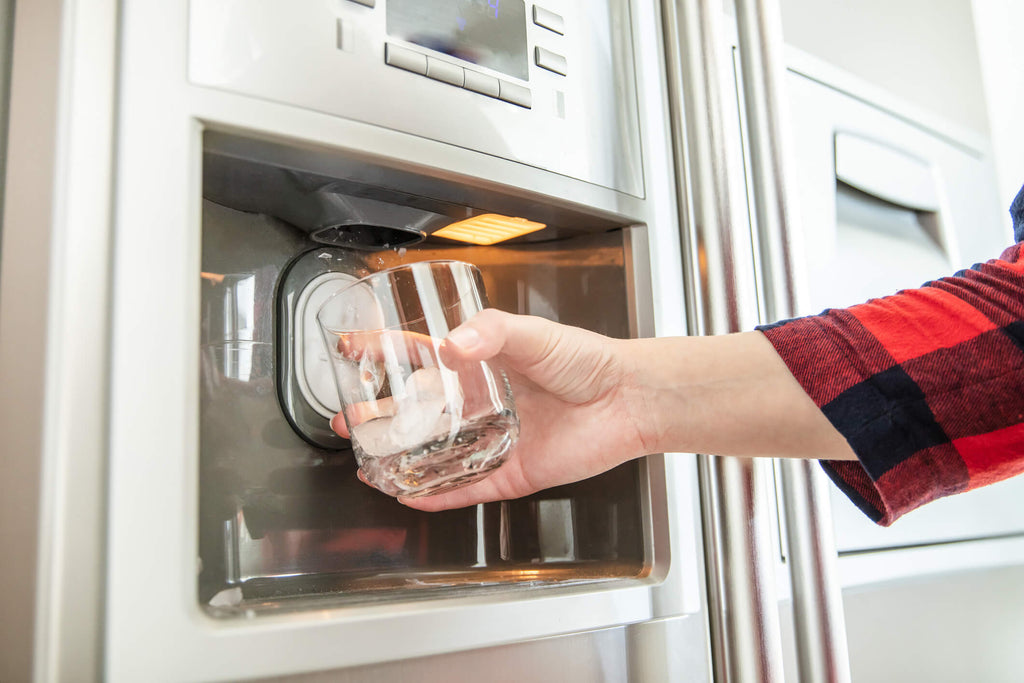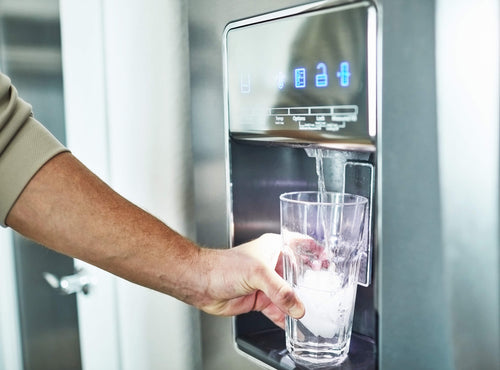Almost all modern refrigerators are equipped with both water and air filters. However, we often take the benefits of these filters for granted. When food becomes spoiled, water does not taste right, or the refrigerator hits you with a pungent odor once you open the door, the behind-the-scenes work of fridge water and air filters becomes apparent. But how well do refrigerator filters work? Read on to learn more about refrigerator filters, what they are designed to remove, and alternative solutions to water contamination.
Key takeaways
- Refrigerator water filters improve the taste of tap water, but they do not remove as many contaminants as other types of systems.
- Fridge air filters prevent food from spoiling quickly and remove odors from your refrigerator.
- Fridge water filters must be replaced once every six months to effectively remove contaminants.
- Reverse osmosis systems, other under-sink water filters, and water pitcher filters are popular alternatives to refrigerator water filters. Each type of filter offers unique advantages over the others.
What is a refrigerator filter?
A refrigerator filter cleans either the drinking water exiting a fridge’s water dispenser or air as it enters the system. The term refrigerator filter can refer to either a water or air filter inside your fridge, but it more commonly refers to a water filter. While refrigerator water filters remove foul tastes and odors from water, fridge air filters clean the air circulating in the fridge. Fridge air filters are typically installed into the upper back section of a refrigerator. They allow food to stay fresh for longer, spoil less often, and not mix odors with other foods. Refrigerator water filters are installed in a housing whose location is dependent on your refrigerator model. They make tap water taste and smell more pleasant by removing additive chemicals.
How do refrigerator filters work?
Refrigerator water filters use a combination of sediment and activated carbon filtration. They are designed to remove three major contaminants from water: lead, chlorine, and volatile organic compounds (VOCs). Lead and VOCs are EPA-regulated contaminants, meaning tap water must contain levels of these contaminants below a certain threshold. Chlorine, on the other hand, is added to tap water to kill microorganisms in water. While chlorine is effective at making water microbiologically safe, it gives water an unpleasant taste and smell. Refrigerator water filters help remove these foul tastes and odors from tap water.
Learn more: When to replace your refrigerator water filter
Fridge air filters use a carbon-based filter media to neutralize odors and bacteria in the air that is taken into the system. Recirculated air also passes through the filter, ensuring the air contacting your food stays free from bacteria. Food spoils faster without a fridge air filter and can become contaminated with odors and bacteria from other foods.
Learn more: What is a refrigerator air filter and is it necessary?

Is fridge water safe to drink?
Yes, fridge water is safe to drink if your refrigerator is hooked up to city-treated water and the water’s safety is not compromised. If you are under a boil water advisory, you should not drink or cook with water that comes out of your fridge without boiling it first. If you receive water from a well, you must first have an appropriate whole-house water treatment system installed before fridge water is safe for drinking or cooking.
Learn more: How to Install a Whole House Water Filter for Well Water
Do fridge filters work?
Yes, refrigerator water and air filters effectively remove the contaminants they are designed to remove. However, if your goal is to remove as much contamination from water as possible, then a refrigerator water filter will not meet your requirements. Rather, a fridge water filter aims to provide water that removes unpleasant tastes in tap water. For more advanced filtration, you will need another type of water treatment system.
Advantages of fridge water filters
Refrigerator water filters provide many advantages over other types of water filters and treatment systems.
- Convenient. Fridge water filters simple must be changed once every six months. In the meantime, you can enjoy filtered water from your refrigerator at a moment’s notice.
- High flow rate. Unlike many other filtration systems, such as reverse osmosis, fridge water filters filter as quickly as water is dispensed from your refrigerator.
- Inexpensive. The price of fridge filters typically ranges from $30 to $60. Because they must be changed every 6 months, they cost around $60 to $120 per year.
- Provide good-tasting water. Fridge water filters are designed to provide water that tastes crisp and clear.
- Easy to replace. When the time comes to replace a fridge water filter, you must simply twist out the old filter, slide in the new one, and flush the system.
- Compact. Because refrigerators are designed with a special housing for the water filter, fridge water filters do not take up usable space.
- Filter ice as well. Not only do refrigerator water filters conveniently filter drinking water, but they also filter the water used to make ice.

Disadvantages of fridge water filters
While they provide many advantages, fridge water filters are outperformed by many other filtration systems.
- Do not address many contaminants. Some filtration systems, such as reverse osmosis, address far more contaminants than fridge water filters. Fridge filters should never be the sole filter used on contaminated water sources.
- Can become clogged. To avoid clogs, remember to change the filter once every six months.
Advantages of fridge air filters
- Keep food fresh for longer. By killing bacteria and removing particulate matter from a fridge’s air, a refrigerator air filter prevents food from spoiling as fast as it normally would.
- Prevents cross-contamination. Fridge air filters can save you from foodborne illness by preventing bacteria from one food from affecting another.
- Neutralizes odors. Fridge air filters keep your refrigerator smelling fresh and clean.
Disadvantages of fridge air filters
- Higher upfront cost than no filtration. While fridge air filters are inexpensive, they cost more than having no air filtration at all. Because fridge air filters can prevent food from spoiling quickly, however, they can save you on food costs during the life of the filter.
- Can be easy to forget. Many modern refrigerators possess a filter light to remind you when the air filter must be changed. Others may not, making it easy to forget when the air filter must be changed.
Alternatives to fridge water filters
Instead of using your fridge’s water filter for drinking and cooking water, you can use a point-of-use system that installs under your kitchen sink, a countertop filtration method, or a water pitcher filter. All these options have advantages and disadvantages when it comes to cost, maintenance, and filtration quality.
Reverse osmosis systems
A reverse osmosis (RO) system is a high-purity alternative to refrigerator filters. Not only do RO systems remove the foul tastes and odors caused by chlorine and chloramine, but they also reduce levels of almost all other contaminants as well. RO systems install under your kitchen sink, allowing for convenient access to water for drinking and cooking. Unless a booster pump or permeate pump is installed with the system, RO systems do not require electricity to operate. While convenient, reverse osmosis systems do not work as quickly as fridge water filters.
A reverse osmosis system can cost as little as $280. While RO systems are much more expensive than fridge filters, the quality of water produced by RO justifies this price differential. Water produced by RO systems is also more versatile. Unlike water from a fridge filter, RO water can easily be used for cooking, cleaning vegetables, and washing dishes.
Advantages:
- Reduce levels of almost all contaminants
- Store more water than pitchers
Disadvantages:
- More complicated installation than other under-sink systems and pitcher filters
- Not installable in rented properties
- More expensive than other options
- Have a limited storage capacity, unlike refrigerator filters
Learn more: What is reverse osmosis?
Under-sink water filters
Under-sink water filters include reverse osmosis systems, but there are also many other types available. Carbon under-sink water filters, for example, provide similar filtration to refrigerator filters, making them an excellent alternative for renters or homeowners whose fridge does not include a water dispenser. Unlike refrigerator filters, most under-sink filters must be mounted under your sink, making installation slightly more complicated than fridge filters.
Under-sink water filters typically cost as much as refrigerator filters, but some more expensive options are available. You can purchase some under-sink systems that provide more thorough filtration, but they come at a premium price. Maintenance on under-sink filters is also similar to refrigerator filters. Under-sink carbon filters, just like fridge filters, must be replaced once every 6 months. The replacement cartridges also typically cost as much as replacement refrigerator filters.
Advantages:
- Improves taste of tap water
- High flow rate
- Can be used in rented properties
- Similar cost to fridge filters
Disadvantages:
- Take up space under sink
- Slightly more complicated installation process than fridge filters
Learn more: 5 of the best under-sink water filters
Water pitcher filters
Water pitcher filters offer similar filtration quality to fridge water filters, but they must be manually filled and given time to filter out contaminants. Most water pitcher filters will take between 10 and 20 minutes to filter a pitcher full of water. Fridge water filters, on the other hand, filter at the rate which water flows through it. As a result, there is no wait time with refrigerator water filters like there is for water pitcher filters.
Water pitcher filters are available in a variety of configurations at many price points. Water pitcher filters can cost as little as $20 and as much as well over $100. Some pitcher filters utilize activated carbon media, some may use ceramic filtration, and others may use a combination of different media types. With so many types of water pitcher filters available, you can choose the one that best suits your wants, needs and budget.
Advantages:
- More convenient than other alternatives
- Useful for fridges without a drinking water dispenser
- Inexpensive relative to reverse osmosis systems
- Many types to choose from
Disadvantages:
- Limited storage capacity, unlike refrigerator filters
- Slower filtration rate than fridge filters
- Takes up space in refrigerator
If you have any additional questions, please do not hesitate to contact us.
